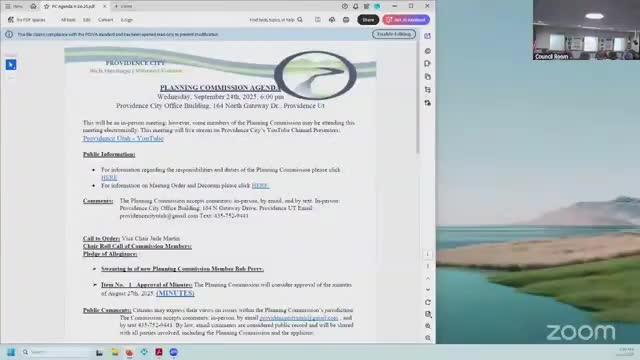Providence planning commission sends proposed temporary gravel-pit rules to public hearing
Get AI-powered insights, summaries, and transcripts
Subscribe
Summary
The Providence Planning Commission voted to set a public hearing on proposed land-use code language that would allow temporary gravel extraction tied to subdivisions, require traffic and business plans, annual review, and reclamation measures while staff consult the city attorney and engineer to tighten protections against expansion under recent a
The Providence Planning Commission voted to set a public hearing on proposed land-use code language to allow temporary gravel extraction tied to subdivisions and development projects, saying staff should return after additional review with the city attorney and city engineer.
The change would permit on-site excavation for projects that need material for roads and infrastructure while imposing requirements such as a site-specific traffic plan, a business plan, annual review, and reclamation and slope-stability documentation. Commission members raised concerns about how the proposal interacts with recently passed state extraction legislation and whether a conditional-use pathway could enable expansion of pits beyond what the city intends.
Adam, a city staff member presenting the draft, said the city intends to require both a business plan and a traffic plan specific to each pit, and that the permit would be subject to annual review. "Whatever we do, we don't want to give them the idea that they can use this new state code and then just expand, expand, expand," he said, citing concern about state law provisions that allow expansion under certain conditions.
Commission members pressed for more detail on several points they said remain "not specified" in the draft: the definition of "temporary" (duration and allowable volume), whether temporary permits can be renewed indefinitely, the process and grounds for revoking a permit at annual review, and the specific penalties for violations. Staff said penalties would default to the city code in Title 1 (which includes infractions and class C and class B misdemeanors) unless the draft calls out separate sanctions.
Several members urged that the traffic plan and business plan be codified so applicants know upfront what documentation is required. A planning commissioner noted that allowing annual conditional-use renewals without a firm limit risks creating a de facto permanent pit.
Commissioners also debated technical safeguards around slope stability and reclamation. The staff presentation and comments referenced the city's existing sensitive-area rule that disallows disturbing slopes of 30 percent (a 3:1 run-to-rise) or greater; another participant noted the state Division of Oil, Gas and Mining (DOGM) default standard is 1:1 unless an engineer certifies steeper slopes are stable. Commissioners asked that site plans be prepared or certified by a licensed engineer and that final grading conform to the subdivision's approved preliminary plat.
The draft assigns the Administrative Land Use Authority (the public works director, the city engineer and the community development director) the responsibility to make findings confirming mitigation strategies for stormwater, dust control, fire suppression, operations reporting and other controls. Commissioners asked why the planning commission would not be part of those administrative decisions; staff explained the city's ordinance limits planning commission involvement to preliminary plats, multifamily reviews and legislative actions.
Staff said the draft references reclamation and slope-stability calculations to ensure final reclaimed slopes are stable. They also said the draft targets pits used in conjunction with an approved development rather than approving independent commercial gravel operations; staff noted separate licensing and approvals would be required for a business that sells material to the public.
On public notice and neighbor outreach, staff said the city would post the site with an A-frame sign and publish notices on the city and state websites; historically the city has not proactively notified neighbors when construction starts on a subdivision unless neighbors inquire.
After discussion, a commissioner moved to set a public hearing; the motion was seconded and carried by voice vote. The commission directed staff to consult further with the city attorney and city engineer, incorporate clarifications (including a clear definition of "temporary" and engineering requirements for slope stability), and return a revised draft for scheduling and public notice.
Votes at a glance
- Motion to set a public hearing on the proposed temporary gravel-pit regulations: approved (voice vote). Recorded vocal "Aye" responses were made by a planning commission member and the chair during the roll; the motion carried and staff will return with revisions and a proposed public-hearing date for posting.
The commission concluded the item by asking staff to do additional homework on municipal code language and the interaction with the new state extraction law, then bring an updated draft for public hearing scheduling and further review.
